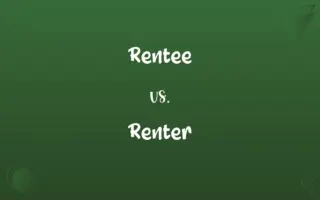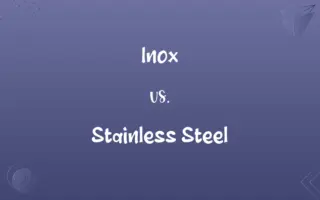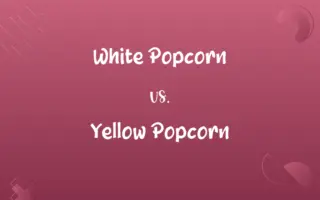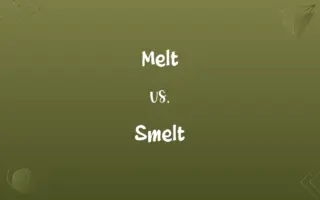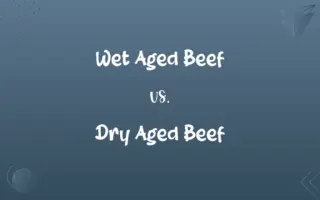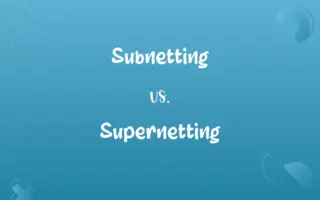Reactant vs. Reagent: Know the Difference

By Shumaila Saeed || Updated on December 25, 2023
A reactant is a substance consumed in a chemical reaction, while a reagent is used to cause or measure reactions but may not be consumed.
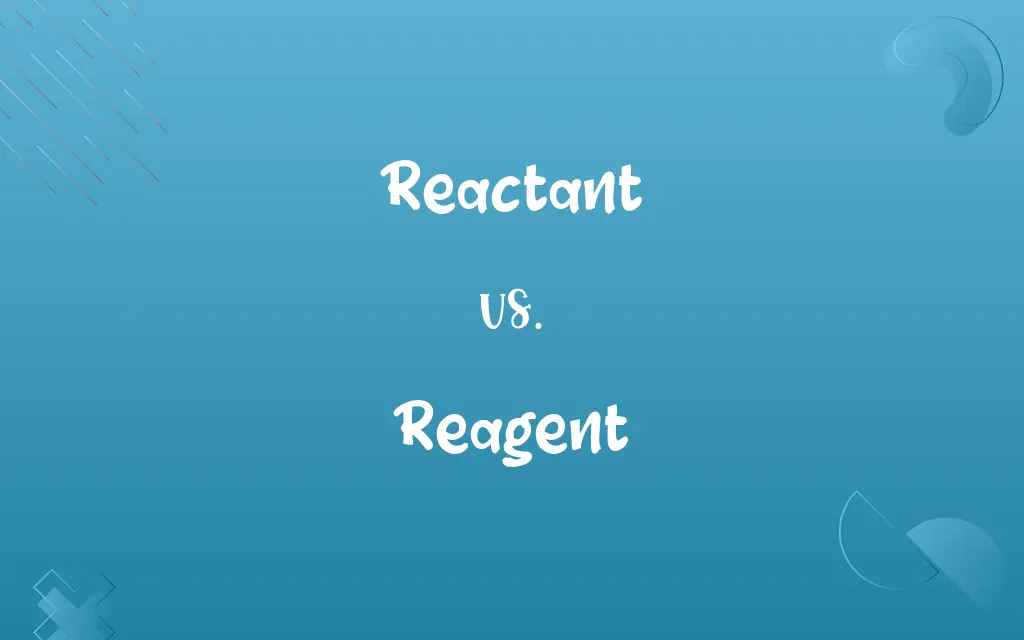
Key Differences
Reactants are substances that undergo change during a chemical reaction. Reagents, on the other hand, are used to initiate or facilitate a reaction, often without being consumed or altered.
Shumaila Saeed
Dec 07, 2023
In a laboratory, reactants are the starting materials of a chemical reaction. Reagents might be catalysts, indicators, or other substances that aid in the reaction or analysis but aren't the main substances being reacted.
Shumaila Saeed
Dec 07, 2023
Common reactants include elements or compounds like hydrogen and oxygen in a combustion reaction. Reagents include litmus paper in acidity testing or catalysts in synthesis reactions.
Shumaila Saeed
Dec 07, 2023
Reactants are consumed and converted into products. Reagents, while they might interact with reactants, typically remain unchanged and do not become part of the reaction products.
Shumaila Saeed
Dec 07, 2023
In chemical equations, reactants are listed on the left side of the reaction arrow. Reagents may not always be listed in the equation but are essential for the process.
Shumaila Saeed
Dec 07, 2023
ADVERTISEMENT
Comparison Chart
Definition
Substance consumed in a chemical reaction
Substance used to cause or measure reactions
Shumaila Saeed
Dec 07, 2023
Role in Reaction
Undergoes chemical change
Initiates or facilitates reaction
Shumaila Saeed
Dec 07, 2023
Consumption
Consumed and transformed into products
Typically not consumed or altered
Shumaila Saeed
Dec 07, 2023
Representation
Listed on the left side of the reaction arrow
Not always listed in the chemical equation
Shumaila Saeed
Dec 07, 2023
Examples
Hydrogen and oxygen in combustion
Catalysts, indicators, titrants in experiments
Shumaila Saeed
Dec 07, 2023
ADVERTISEMENT
Reactant and Reagent Definitions
Reactant
Reactants are substances that participate in chemical reactions.
Oxygen is a reactant in combustion.
Shumaila Saeed
Nov 26, 2023
Reagent
Reagents are used to facilitate or start chemical reactions.
A catalyst was added as a reagent to speed up the reaction.
Shumaila Saeed
Nov 26, 2023
Reactant
Reactants are the starting materials in a reaction.
The reactants for the experiment were carefully measured.
Shumaila Saeed
Nov 26, 2023
Reagent
Reagents are substances used in chemical tests.
The litmus paper, a reagent, indicated the solution's acidity.
Shumaila Saeed
Nov 26, 2023
Reactant
Reactants are consumed during the reaction process.
All reactants were used up in the reaction.
Shumaila Saeed
Nov 26, 2023
ADVERTISEMENT
Reagent
Reagents often do not get consumed in a reaction.
The reagent remained unchanged after the experiment.
Shumaila Saeed
Nov 26, 2023
Reactant
Reactants are precursors to the products in a reaction.
The reactants combined to form water.
Shumaila Saeed
Nov 26, 2023
Reagent
Reagents are used in analysis to detect or measure other substances.
A color-changing reagent was used to detect the presence of ions.
Shumaila Saeed
Nov 26, 2023
Reactant
Reactants undergo a chemical transformation.
Reactants were converted into new compounds.
Shumaila Saeed
Nov 26, 2023
Reagent
Reagents can act as catalysts or indicators in chemical processes.
The enzyme, acting as a reagent, catalyzed the reaction.
Shumaila Saeed
Nov 26, 2023
Reactant
A substance that is altered or incorporated into another substance in a chemical reaction, especially a directly reacting substance present at the initiation of the reaction.
Shumaila Saeed
Oct 19, 2023
Reagent
A substance used in a chemical reaction to detect, measure, examine, or produce other substances.
Shumaila Saeed
Oct 19, 2023
Reactant
(chemistry) Any of the participants present at the start of a chemical reaction, specifically one that is consumed during the reaction.
Shumaila Saeed
Oct 19, 2023
Reagent
(chemistry) A compound or mixture of compounds used to treat or test materials, samples, other compounds or reactants in a laboratory or sometimes an industrial setting.
Shumaila Saeed
Oct 19, 2023
Reactant
A chemical substance that is present at the start of a chemical reaction
Shumaila Saeed
Oct 19, 2023
Reagent
A substance capable of producing with another a reaction, especially when employed to detect the presence of other bodies; a test.
Shumaila Saeed
Oct 19, 2023
Repeatedly Asked Queries
Can reagents be part of the final product?
Usually, reagents are not part of the final product.
Shumaila Saeed
Dec 07, 2023
Are reactants always visible in a reaction?
Yes, reactants are the visible starting materials.
Shumaila Saeed
Dec 07, 2023
How are reactants different from products?
Reactants are starting materials that transform into products.
Shumaila Saeed
Dec 07, 2023
Do reagents get used up like reactants?
Reagents typically do not get used up or change.
Shumaila Saeed
Dec 07, 2023
Do reactants change state during a reaction?
Often, reactants change physical or chemical states.
Shumaila Saeed
Dec 07, 2023
Can a reactant also be a reagent?
In some reactions, a reactant can act as a reagent.
Shumaila Saeed
Dec 07, 2023
Is water a reactant or a reagent?
It can be either, depending on the reaction context.
Shumaila Saeed
Dec 07, 2023
Can the same substance be a reactant in one reaction and a reagent in another?
Yes, depending on the reaction's context.
Shumaila Saeed
Dec 07, 2023
Is the role of reagents always active in a reaction?
Reagents play various roles, from passive to active, depending on the reaction.
Shumaila Saeed
Dec 07, 2023
Can an element be a reactant?
Yes, elements can be reactants in chemical reactions.
Shumaila Saeed
Dec 07, 2023
Are reagents always necessary for a reaction?
Reagents are essential for certain types of reactions or analyses.
Shumaila Saeed
Dec 07, 2023
Do reagents affect the rate of reaction?
Some reagents, like catalysts, can affect reaction rates.
Shumaila Saeed
Dec 07, 2023
Are reagents involved in the formation of products?
They facilitate the reaction but are not typically product components.
Shumaila Saeed
Dec 07, 2023
Can reactants be recovered after a reaction?
Usually, reactants are transformed and cannot be recovered.
Shumaila Saeed
Dec 07, 2023
Are reactants always listed in a chemical equation?
Yes, reactants are always listed on the left side.
Shumaila Saeed
Dec 07, 2023
Do reagents determine the reaction path?
Reagents can influence the path or type of reaction that occurs.
Shumaila Saeed
Dec 07, 2023
Share this page
Link for your blog / website
HTML
Link to share via messenger
About Author
Written by
Shumaila SaeedShumaila Saeed, an expert content creator with 6 years of experience, specializes in distilling complex topics into easily digestible comparisons, shining a light on the nuances that both inform and educate readers with clarity and accuracy.








